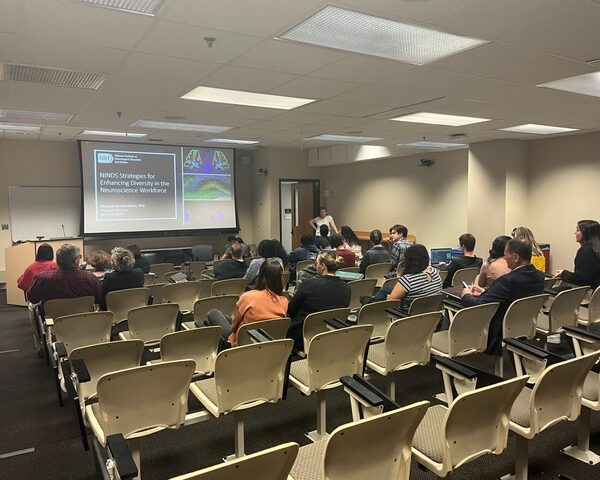By Cherie Saffold
 The Vanderbilt School of Medicine Basic Sciences’ pharmacology department and the Vanderbilt Center for Addiction Research hosted a special event on April 22 focused on the importance of funding for diverse trainees and faculty in academic settings who are committed to studying the brain. This presentation, which featured keynote speaker Marguerite Matthews from the National Institutes of Health, aimed to give the research community, particularly those who come from diverse backgrounds, knowledge about the various grants to fund trainees and faculty at various stages of their careers who are underrepresented in science.
The Vanderbilt School of Medicine Basic Sciences’ pharmacology department and the Vanderbilt Center for Addiction Research hosted a special event on April 22 focused on the importance of funding for diverse trainees and faculty in academic settings who are committed to studying the brain. This presentation, which featured keynote speaker Marguerite Matthews from the National Institutes of Health, aimed to give the research community, particularly those who come from diverse backgrounds, knowledge about the various grants to fund trainees and faculty at various stages of their careers who are underrepresented in science.
“We want to make sure that people who want to stay in the academic research space have funding to do so,” Matthews said, but she added that it “takes a diversity of perspective and backgrounds.”
Matthews, who is the section chief of career preparation at the National Institute of Neurological Disorders and Stroke’s Office of Programs to Enhance the Neuroscience Workforce, started her presentation by discussing how NINDS, one of the NIH’s 27 institutes, supports diversity for academic trainees and faculty through the institute’s bridge funds, which supplement active NIH research grants. These funds support awardees as they gain research experience, generate preliminary data, and prepare to apply for more NIH funding. These bridge funds support underrepresented individuals from the high school to faculty level, and they include one to three years of funding and mentorship.
Additionally, NINDS has re-entry and re-integration supplement programs, Matthews explained. The re-entry supplement program funds Ph.D. students who are re-entering biomedical research after a disruption. This supplemental funding lasts for a minimum of one year and should help awardees as they prepare to apply for additional research support. The re-integration supplement program funds predoctoral and postdoctoral researchers relocating from unsafe or discriminatory work environments. The goal is to provide these individuals with a timely and seamless continuation of their research training program and to safely reintegrate into the biomedical workforce.
Matthews also talked about NIH fellowships, including the NIH Diversity NRSA Predoctoral Fellowship. This grant is similar to the traditional F31, which can support up to five years of predoctoral research training for Ph.D. students, in that it funds promising predoctoral students to obtain individualized, mentored research training from outstanding faculty sponsors while conducting research projects. However, this grant is specifically for scientists from populations underrepresented in science, including scientists from certain racial/ethnic backgrounds, with disabilities, from disadvantaged socioeconomic backgrounds, or who are women.
Matthews then spoke about predoctoral and postdoctoral career transition grants. The NIH Diversity Specialized Predoctoral to Postdoctoral Advancement in Neuroscience Award, an F99/K00 grant, supports late-stage Ph.D. students from diverse backgrounds in their transition to a postdoctoral fellowship. The grant provides one to two years of graduate student funding and four years of postdoctoral funding.
“You can dream about the science you want to do or didn’t have time to do in your Ph.D.,” Matthews said of this particular grant, as students do not need to have a confirmed postdoctoral position or funded post-graduate project to apply. NINDS has similar transition programs for postdoctoral fellows, including the BRAIN Initiative® Advanced Postdoctoral Career Transition Award to Promote Diversity, which is a K99/R00. This grant is designed to help underrepresented postdocs secure independent research positions studying areas supported by the BRAIN Initiative.
There are also diversity funding opportunities for research faculty. These include diversity R01s for new or at-risk investigators from underrepresented backgrounds and ReWARD R01s for investigators promoting diversity, equity, inclusion, and accessibility.
The latter half of the event included a panel discussion on funding opportunities. The panel consisted of Matthews and Vanderbilt trainees José Zepeda, Devan Gomez, and Kimberlyn Ellis, who have received external funding. They provided useful advice about applying for funding.
Zepeda, a Ph.D. student in the pharmacology department and a National Science Foundation Graduate Research Fellowships Program recipient, said it’s important to begin assembling applications well in advance, as these applications require many rounds of editing and review. Zepeda also emphasized the importance of having multiple people from diverse backgrounds read your application. He had around 15 people read his application, and got his most useful advice from a plant biologist!
Gomez, a postdoctoral fellow in the lab of Erin Calipari and an F99/K00 awardee, agreed with Zepeda’s sentiment. “You have people who are more interested in helping you than you could ever imagine,” he said. “These people will inspire you to believe in yourself and give you confidence.”
Matthews and Ellis, a Ph.D. student in the Human Genetics program and a Howard Hughes Medical Institute Gilliam Fellowship awardee, said it’s important to be authentic and articulate in applications. “There’s lots of pressure to sound a certain way, but people will appreciate getting to know who you are,” Ellis said. Matthews added that it is not your job to impress anybody. Instead, make your goals and intentions clear. “Anyone should be able to pick your application up and know what your grant is about,” she said.
Go further
Knowing about and understanding the many NIH grants that are available can be daunting, so Matthews and colleague Lauren Ulrich help potential applicants through the NINDS’s podcast Building Up the Nerve, in which they discuss the facets of navigating an independent research career, such as mentoring and building successful grant applications.